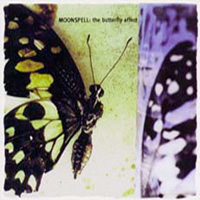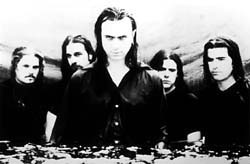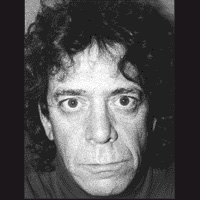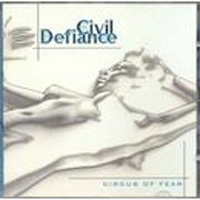 Moonspell
Moonspell
The Butterfly Effect (Century Media)
An interview with vocalist Fernando Ribiro
by Martin Popoff
The butterfly effect is basically this pop science nugget of a mindblower that states that if a butterfly flaps its wings on one side of the world, you may get a cyclone right ’round the other side. It’s an interesting theory (usually considered synonymous with chaos theory) that has popped up in many casual conversations between people trying to look smart.
But few have thought about the implications of the butterfly effect as much as university-trained philosopher and Moonspell lyricist/vocalist Fernando Ribeiro. In fact, the concept practically propelled the band’s harsh, often industrial new album into being, Ribeiro offering that, “The Butterfly Effect (Century Media) flowed very naturally, because it was an album that grew out of the title. We had something to direct our energy toward. That was 50% of the job done!”
Ribeiro is a complex tangle of dark philosophies, most which have swung in concentric circles around exotic occult readings, arriving in tightening arcs at the untapped powers of man and man alone. But then there is cold science, or more pointedly, dumb chance. This is where Moonspell meets the butterfly effect. “We’ve grown up with the butterfly effect as a concept, not only lyrically, but in the more global perspective of music, and even within our own lives. The butterfly effect was originally born in a scientific atmosphere. It’s just one of the branches of chaos theory, which has been developed since the beginning of this century. It’s somewhat irrational, but it’s a science that started realizing the importance of small things and mistakes as a kind of progression. It’s a fascinating metaphor for life. It also has importance with respect to Moonspell, which was created and transformed by small, insignificant things that could create big passions and big obsessions.”
In surface terms, look for a crashier album this time around, versus the lush recline of Sin Pecado. Ribeiro: “Actually, they were born under different atmospheres. The Butterfly Effect is a more complete album because it incorporates a lot of the aspects that are unique to Moonspell. It’s also musically heavier and more aggressive, whereas Sin was more melodic and on the experimental side. This one is, I don’t know, a gathering of the actualities and the soul of Moonspell, and it’s the style we want to pursue into the future.”
Noting the stomping industrial elements, I had to ask what music is floating Fernando’s boat these days. “Well, just by listening to other kinds of music, you get influence. That’s always been the case for Moonspell. Actually, we formed the band because we’d just met Quorthon from Bathory in ’89 and we were so impressed by him and his band that we went and formed our own band. But for this album, we tried to look more inside ourselves. It was important to have a style of our own. Of course, every band says that, but they don’t really prove it by progressing in this way. For us, the test is putting it on the CD player and you say ‘yes that’s Moonspell, but for 1989 or whatever, 1995’ – that’s what we tried to do. But even though we try to be inspired by ourselves, I’d say there are a couple of bands that saved metal’s reputation (laughs). One of them was Katatonia with Tonight’s Decision and the other was Type O Negative with their new album, World Coming Down. But we only had contact with these albums after our album was done.”
Perhaps responding to some of the wrinkled noses that greeted the somewhat-departured Sin Pecado, Moonspell found themselves, or more likely, placed themselves at a crossroads. “After we finished the last tour of Europe, we had to re-evaluate a lot of things, not really in terms of the line-up, but the direction. A routine had to be broken. We felt we were at an arrival point. We had to figure out how to reconcile having a receiver for our art and having a vehicle for our emotions. And I think The Butterfly Effect was the most perfect answer we could come up with.”
While the music on The Butterfly Effect can best be described as panoramic and large, widening towards the gulfs of Goth and industrial in equally deafening doses, it is Fernando’s lyrical skill which cuts through; quite the feat, given that English is not this Portuguese band’s native tongue. Fernando lays down the general framework, a web of borrowed and personal philosophical underpinnings that have found their way most pointedly into his black metal-munching side project, Daemonarch.”
 Actually, it was born some years ago, when I was into a more active form of personal ritual, and trying to invent and comprehend my own ways inside all the information I was gathering, not only from occult books and all that stuff that people primarily relate to as a form of rebellion against Christianity, at least in Portugal. And I’ve constructed a lot of poetry, a lot of lists of names, and terminology that was behind that, and invented my own version of things. And these things were always on paper until I got the opportunity and the idea of putting them on a record and getting them out of my system so I could go into a higher stage of these things. So, my way inside occultism was always the way of hermetics, was always the way of having a personal interpretation and a personal fulfillment out of that. Because I don’t like the idea that Satanism or occultism uses you as a tool. I think it’s the other way around. And if I could define myself, I would say that I am a radical anthropocentrist, man in the center of everything, because I think everything has to be used by man for his glory or his disgrace. So this is exactly what Daemonarch, and even Moonspell, stands for. And this is exactly what I stand for as a person, and what I stand for on any of my projects.”
Actually, it was born some years ago, when I was into a more active form of personal ritual, and trying to invent and comprehend my own ways inside all the information I was gathering, not only from occult books and all that stuff that people primarily relate to as a form of rebellion against Christianity, at least in Portugal. And I’ve constructed a lot of poetry, a lot of lists of names, and terminology that was behind that, and invented my own version of things. And these things were always on paper until I got the opportunity and the idea of putting them on a record and getting them out of my system so I could go into a higher stage of these things. So, my way inside occultism was always the way of hermetics, was always the way of having a personal interpretation and a personal fulfillment out of that. Because I don’t like the idea that Satanism or occultism uses you as a tool. I think it’s the other way around. And if I could define myself, I would say that I am a radical anthropocentrist, man in the center of everything, because I think everything has to be used by man for his glory or his disgrace. So this is exactly what Daemonarch, and even Moonspell, stands for. And this is exactly what I stand for as a person, and what I stand for on any of my projects.”
Now does that mean you don’t believe anything happens outside of a material Earthly plane? “I think there are things we don’t know about ourselves, powers that we don’t know that we have. And I think we basically have the power to suggest almost anything. I’ve studied philosophy for four years in university, and we had an anthropology class as well, and it’s unbelievable when you study tradition and creation and mythology. It’s really unbelievable how sensitive you become to the power of man. So I think man has the power to do anything and has the power to choose. A practical example is this double-sided nature of man. There was a solar eclipse some months ago – which is a secular experience that not a lot of people get to see or experience – and we have the power of not seeing it, and just lying on the bed sleeping. I think this is really a puzzling thing about human nature, when you have the power to do so, I think it’s even easy to create God and supernatural mysteries. This isn’t science, I think it’s pure reality. I think it’s the salt of life when you think you can go to the beach and have a few beers with gorgeous girls around, and you’re thinking about suicide and death and all the horrible things in life. I think this is actually the ultimate power of your own imagination. When you set your mind to doing something, and dedicate every moment of your life doing it, I think you can achieve it. And I think the world is definitely a manifestation of that.”
But life is finite, no? You get your 75 years and that’s it. “But I think that’s more than enough (laughs).”
So pressed whether he is a believer in cold hard science – nothing more, nothing less – Fernando swings it back to the power within. “I believe science was discovered by man. It’s a tool of man. Of course, there is a double nature, a second side of things. Sometimes you’re engulfed by your own creations. I think the best example is Christianity and God, which are basically a representation of man and a recovery of a lot of ancient religions and philosophies. When you study Christianity, you can definitely compare it with some of Plato’s theories, all the stuff coming out of ancient Greece. So it’s difficult for man to separate himself from his own creations, and sometimes they really overcome him. But at the end of the day, when you go for a really typical analysis, and say that God is good and Satan is evil, these are all human qualities. These are all human attributes, and you cannot really speak about them in a totally supernatural language, because every supernatural language comes out at the end through filter after filter.”
“Adaptables” is a song on the new record that supports this thesis of man’s superiority. “That one is about humanity as well. I think the human factor on the Moonspell lyrics in the past was always subliminal. After four albums of writing lyrics, I became more of a protagonist, verses always talking in the third person or whatever. ‘Adaptables’ is about what separates us from all the other animals, which is our faster and more accurate capacity to adapt to situations, to weather, I don’t know, heartbreaks (laughs).”
“I Am The Eternal Spectator” is perhaps one of the more succinct yet poetic lyrics on the record. Set to a choppy jackhammered dance throb, Fernando looks at the conundrum of passivity. “Being a spectator of the world is one of the most common and most debated subjects of modern philosophy. Nowadays, there is a kind of vigilant and voyeuristic state of mankind. As I said, man is sometimes swallowed by the things that he creates and just becomes a spectator to them. ‘I Am The Eternal Spectator’ is about this vigilance and this modern philosophical game of trying to figure out how positive and how life-fulfilling this state can be, which is really tough, really difficult, because man was supposed to always be an agent, and not a reactor. But nowadays, it’s much more the other way around because he doesn’t recognize his own role. And, of course, the mission of life is to recognize what is already yours. I think modern philosophy goes around espousing that one of the major goals of man is to reappropriate things that were ours. And ‘I Am The Eternal Spectator’ is a song about this, about simple realities that coexist that do not kill each other, but feed on each other. It becomes a really complex and really dangerous state of mind.”
Expect a pan-global metal stomp in support of The Butterfly Effect, Moonspell primed by their European success (not to mention their hard, intellectual approach to their craft), ready to take the tour over to North American shores, not only once, but perhaps twice. “We don’t have the time or the energy to be involved in any side projects. Right now, we’re promoting this album heavily and we’re preparing for the American tour. We want to play very tight and we want to play very powerful, and this takes a lot of, let’s say, homework to achieve a state that can dignify the band to people that have never seen us. So we will go to Mexico, Canada, and the United States for three weeks. Then we will come back to Portugal and play one or two shows to present The Butterfly Effect to our home audience, go on a headlining tour of Europe, and then hopefully come back to America in March.”
“What matters to me is getting our music to as many people as possible,” Ribeiro offers in closing. “And more sales also means creating better conditions to create better music. It’s not because we want fame or fast cars or fast women or whatever, but we definitely want better conditions to create and perform our music. And the only reward we can give people who buy our records is to do a record each year and to do, in our opinion, something that is genuine, original, and has some quality. I don’t know how many this one is going to sell, but The Butterfly Effect and Sin Pecado, spiritually and physically, very much represent Moonspell. At the end of the day, that’s the most important thing.”
(1453-A 14th St. #324 Santa Monica, CA 90404)



